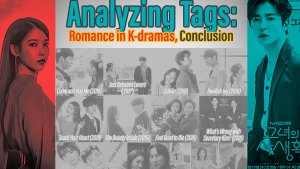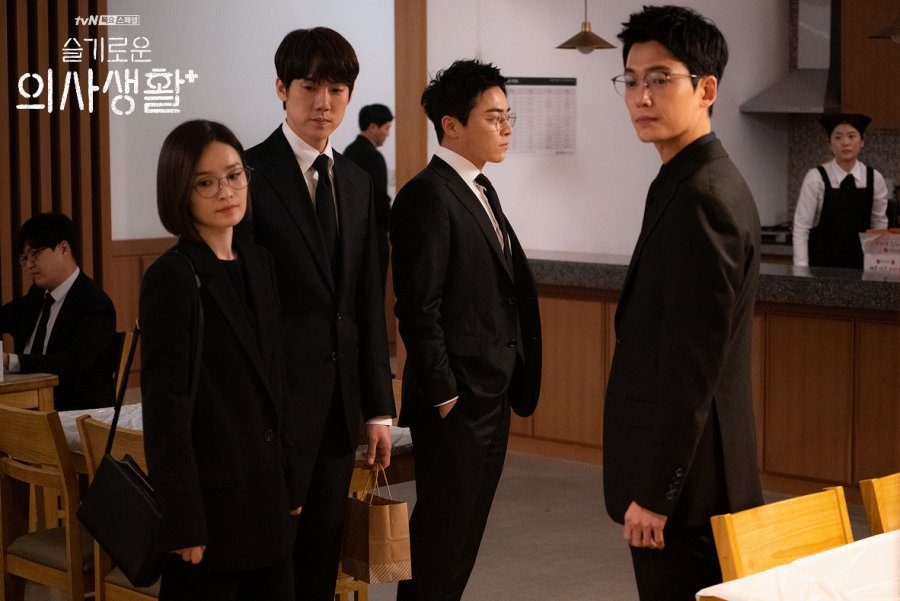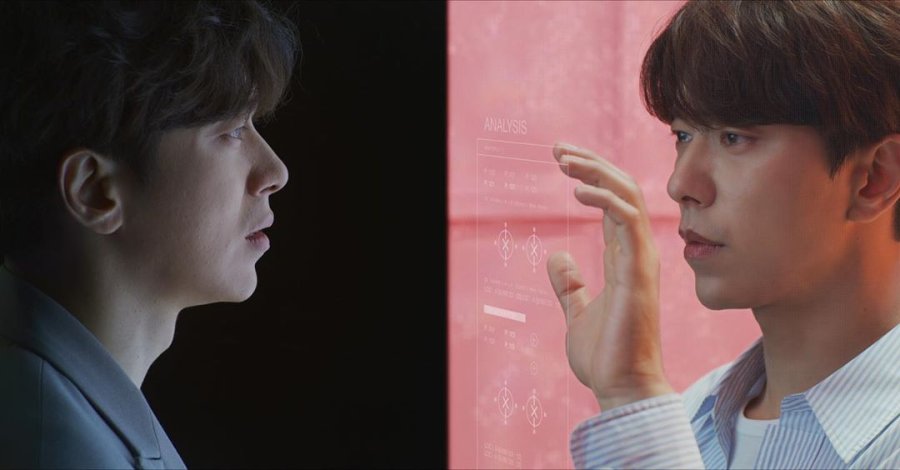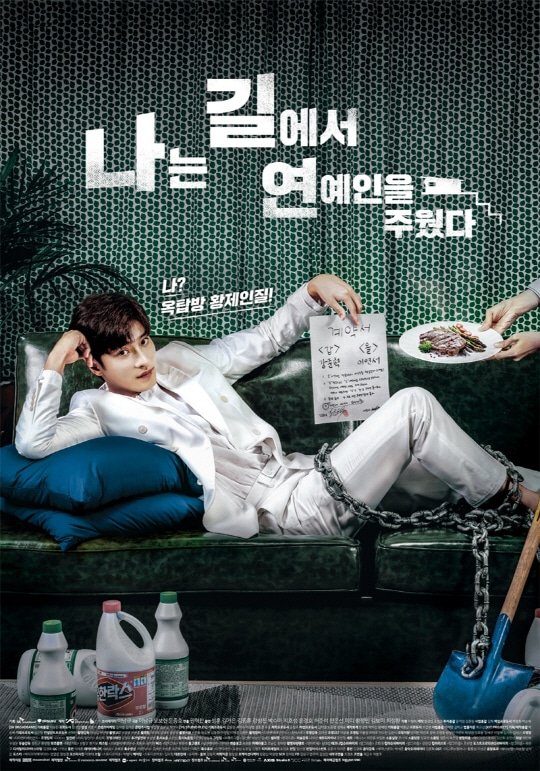 A Tag Analysis: Romance in K-Dramas - Conclusion
A Tag Analysis: Romance in K-Dramas - Conclusion
Dear readers,
As promised, I'm trying to make time to complete this series, but bear with me as I do not have as much time nowadays to dedicate to this hobby - much as I'd like to. Nonetheless, I'll do my best to finish this up promptly.
That said, let's go over the newest table of content for what has now become a massive analysis. If you've read the previous article (part four) you can skip this part, as it's just a reiteration of what's already been established regarding our sample.
Analyzing Tags: Romance in K-dramas | |
| PART ONE | An overview of the Romance genre that focuses on the formulas used in K-dramas and how we can interpret them within the genre. Specifically, we go over the following tags: "Love Triangle", "Lead Chasing" and "Age Gap". |
| PART TWO | Continues the overview of the formulas used in K-dramas by analyzing the following tags: "Office Romance", "Boss/Employee Relationship," "Cohabitation" and "Childhood Connection". |
| PART THREE | Focuses on the tags related to the characters; specifically how we tag a female lead vs a male lead when it comes to Romance. Here we will cover the "friendship" tag which includes: "Bromance" & "Sismance" as well as go through the Money-Related (Poor & Rich Leads) and Financial Discrepancy (Poor Lead/Rich Lead) tags. |
| PART FOUR | This article serves as an overview of both negative and positive attribute tags (strong, weak, smart, etc.) that refer/apply to Female Leads. The purpose is to give an insight into how the audience perceives Female Leads when it comes to romance. |
| PART FIVE (current article) | This article serves as an overview of both negative and positive attribute tags (strong, weak, smart, etc.) that refer/apply to Male Leads. The purpose is to give an insight into how the audience perceives Male Leads when it comes to romance. |
| PART SIX | This article will wrap things up by analyzing the data regarding Male and Female Leads to compare what users and drama-creators focus on when considering the genders and why being aware of this may be important. |
Following the structure of the previous articles, I'm again focusing only on the Romance Genre within K-Dramas. Below, is a reminder of the sample I'm using for this article. I mentioned before, the tag system was implemented in October of 2017 so checking shows from that year forth gave me the best chance to find and cover dramas with enough tags. Also, I further reduced my original sample by filtering out web-dramas (many of which had no tags).
So the tallied numbers that make up the backbone of this article correspond to Romance K-Dramas added to the MDL databased which finished airing between January of 2017 and May of 2020: |
YEAR | 2017 | 2018 | 2019 | MAY 2020 | TOTAL SAMPLE |
# of Dramas added to MDL | 120 | 154 | 148 | 18 | 465 Dramas |
(-) Web Dramas | I had each of the individual numbers of web-dramas set up by year, but I clicked on "home" while I was editing and lost the data. :( Since I still remembered the total, I just rolled with it rather than waste time re-doing this portion. Apologies for that. | - 183 Dramas | |||
# Total Dramas in our Sample | 282Total Dramas | ||||
Now, just like with the previous article, it's important to point out that this analysis isn't absolute and infallible. There is, after all, a margin of error which involves the following points:
- First, I still didn't check to see if all the dramas included had tags when I tallied the numbers. So you'll need to still take the numbers with a grain of salt, as the percentages should probably be higher than what I'm showing.
- I tried my best to filter out web series and only included those with enough episodes (more than 8, 1-hour episodes) which also had relevant tags.
- Keep in mind that, since we're dealing with the human element and everyone perceives things differently, not all tags may be accurate. But, with no way to check their accuracy, the numbers wouldn't account for that "user discrepancy/error".
By the way, you'll note that some of the graphics and examples include recent dramas that are not part of my sample. These have not been taken into account when it comes to the numbers, but I'll be using them simply to illustrate some of my points since I have them fresher in my mind.
With that said, let's jump into it, shall we?

Let's start by clarifying some concepts which came out in the comments during the last article. For this series:
RICH & POOR LEAD TAGSbeing categorized as positive and negative respectively rather than neutral | |||
Since this was an overwhelming amount of work, I was forced to simplify things at the cost of further categorization. So think of "negative" and "positive" as more related to the plot than character. Meaning, how writers treat Poor and Orphan Leads (mostly as victims, especially if they are female) vs how they treat a Rich Main Lead (often positive). | |||
So if one compares who has more powerbetween a Rich & a Poor Lead... the answer would be the former (which, let's be honest, is the same in real life). | |||
Now, if this article aimed to analyze Second Leads, I may have opted to establish the Rich tags as negative, given how often a Second Rich Leads is portrayed as a villain, especially if said Lead is female. But that's an analysis for another series. | |||
ORPHAN LEAD TAGSbeing categorized as negative rather than neutral | |||
While being an Orphan is something that happens to our protagonist, rather than a choice, I still wanted to include it in the gender comparison. Like with the previously discussed tags, think of Orphan as related to the plot rather than to characters. Having said that, the reason I associate Orphan Leads as negative is simply that it's often used as a flaw or as something that the character either struggles with or has to overcome. | |||
It's important to note thatbeing an Orphan doesn'tmake a character a bad person. | |||
But rather, being an Orphan puts that character at a disadvantage. In South Korea, that's even worst, as their culture value bloodlines over everything and that oftentimes extends into K-Dramas. That may be why I've yet to see a drama wherein a male or female orphan protagonist (excluding those that get adopted) doesn't yearn for a family. And that is why I've opted to categorize it as negative for the purposes of this article. | |||
That out of the way, let's go over some general numbers regarding our tags. Keep in mind that with so many new tags popping daily, I only included those that had enough numbers (at the time of data compilation) to make it worthwhile to delve into.
However, if you know of a tag I missed which has high usage, let me know in the comments down below and I'll try to incorporate it into the final article.
MALE LEADSA JERK IN TIN FOIL OR A KNIGHT IN SHINING ARMOR? | |||
A total of 649 tags were tallied involving a description of the Male Lead. From those, the breakdown is as follows: | |||
 | |||
 Love in Sadness (2019) |  Lawless Lawyer (2018) | ||
Negative Tags Tallied:
| Positive Tags tallied:
| ||
Noticed that I picked the same tags as with the Female Leads for a better comparison, which we'll do in the last article of the series. However, as you're about to find out, we tend to focus on very different things when it comes to tagging our male protagonists.
Let's delve into the positive tags for a better understanding:
Is anyone else surprised that
"Rich Male Lead"
wasn't the most used positive tag or at least within the top 3 choices?
Instead, it's the sixth most used tag with a mere 8% usage within our tallied tags. However, if we consider its usage on our sample of Dramas, that percentage jumps to 20%. Another tag that I assumed will have a higher usage is "Successful Male Lead". But with a 5% usage, it sits in seventh place among our sampled tags.
 |
Having said that, I do believe that PLENTY of Dramas with a Successful Male Lead aren't actually tagged as such. The question is... why? Is it because there's this assumption that the average Male Lead is Successful by default and, therefore, most users feel no need to tag that aspect?
Let's start by looking at how the tag has been defined in the MDL database:
Successful Male Lead:
1) Achieved popularity, profit, or distinction within his field. 2) Accomplished his goal, aim, or purpose.
If we also lookup successful in the dictionary, we'll find it defined as "someone who accomplished an aim or purpose and/or who achieved popularity, profit, or distinction." So, if we take these definitions into consideration, then...
Here are some recent Dramas with untaggedSuccessful Male Leads: | ||
 | Yi Gon is the third Korean emperor of his generation, who is regarded highly by his people. He's smart, political and always strives to better his country. The fact that he's beloved by his people means he attained distinction amongst his country as a good ruler. | |
 | The four main male protagonists are all renowned doctors, experts in their respective fields. They are highly regarded by others as professionals and teachers. | |
 | Go Nan Do is the owner of an IT research company and genius inventor of an AI program that takes the country by storm. He's also a self-made man who not only created his company from scratch but has accumulated wealth as well. | |
 | Kim Tae Pyung can see the moment before a person's death. He becomes wealthy and renowned by selling this information to rich people. | |
 | Park Mo Gun is a gifted composer who sets up his own studio to create music for video games. [Although to be fair, he plays more of a supporting role to the Female Lead, so his own story doesn't get that much airtime]. | |
 | Ryan Gold is an art gallery’s director, who used to be a famous painter before he developed a creative block. Still, he's highly regarded and the story ends with him breaking free of said creative block and returning to the industry as a painter. | |
 | Kang Joon Hyuk is a Hallyu Star at the peak of his career. As such, he's shown to have wealth, influence, and popularity. | |
 | Lee Young Joon, the vice president of a company run by his family. He's shown to have wealth due to his good management of the company. | |
 | Kim Min Kyu is the largest shareholder of a financial company. | |
So, as I mentioned at the start of this article, take the numbers with a grain of salt as I'm pretty certain that the data I collected doesn't really reflect a lot of things K-Dramas portray when it comes to our male protagonists. The discrepancy of the tag vs the untagged "Successful Male Lead" is simply one example.
Now, ironically, there were more Male Leads tagged with Hardworking than Successful. In fact, there was a tie in regards to tag usage of Hardworking, Strong, and Rich Male Leads within our sample (11%).
But is there a relationship between a Successful Male Lead and a Hardworking one? Data says, not really.
Hardworking Male Lead is actually tagged twice as much as a Successful Male Lead. But... | |
 |  |
Touch Your Heart (2019) | Hotel del Luna (2019) |
Interestingly, Nice + Smart ML was the most used combination (81 dramas). In fact, a Nice Male Lead was also tagged as Smart 67% of the time and as Calm 45% of the time.
This means that almost
3/10 dramas will feature a "Nice Male Lead",
and half of those will also be tagged as Calm & Smart.
And what about a Strong Male Lead and a Smart Male Lead? | ||
51% of dramaswill only have a Smart ML. | 38% of dramaswill have a Smart & Strong ML. | 11% of dramaswill have a Strong ML. |
This means that9/10 times,users will tag a Smart ML. |  | Whereas 5/10 timesusers will tag a Strong ML. |
So, in conclusion, a "Nice Male Lead" will leave such a big impression on the audience so as to prompt them to use the tag. It also tells us that if a Male Lead is Smart or Calm, there's a high chance of him also being Nice. And perhaps the reason that we're so focused on whether a male protagonist is nice is that there's a silent belief that Male Leads in Romance K-Dramas are usually jerks in tin foil, gaslighting their way into our Female Lead's heart.
So what does this mean for all those Male Leads NOT tagged as Nice?
Well, there are two theories:
- Un-tagged Male Leads = Jerks.
- Un-tagged Male Leads = Normal protagonists. Meaning, they are neither overly nice nor incredibly mean.
In this case, I subscribe to the second line of thought, but mostly when it comes to Dramas produced after 2015. With Dramas prior to that period, I may actually subscribe to the first line of thought. Since I'm only analyzing the data regarding K-Dramas from 2017 to 2020, let's look at why the first theory may be more appropriate by going over the data regarding our negative tags.
NEGATIVE TRAITS TAGS[ 139 ] | |||
 | |||
11% of our sampled Dramashad the "Orphan Male Lead" tag and 8% had the "Poor Male Lead" tag. | If we compare only the tags, we find that Nice Male Lead has a 26% usagevs Orphan Male Lead which has a 5% usage. | ||
 |  | ||
The Last Empress (2018)[ Poor + Nice + Aggressive + Orphan + Smart ML] | Catch the Ghost (2019)[ Poor + Nice + Strong + Smart ML ] | ||
Na Wang Shik is a good-hearted man who, betrayed by those he trusted, sets off on a path of revenge. But behind his callousness and wrath, lies a soul riddled with pain. | Go Ji Suk is a man who would die for those he cares about. His devotion to his mother causes him to sacrifice his career and his relationship. But deep down, all he wants is for someone to notice his pain and offer a helping hand. | ||
Overall... | |||
 |  | ||
 |  |  | |
For context... | |
| For every drama tagged with a Poor Male Lead... | ...two dramas were tagged with a Rich Male Lead. |
 |  |
Big Issue (2019) | Chicago Typewriter (2017) |
This shows that a"Poor Male Lead"is still not as prevalent as a Rich Male Lead. | |
Overall: | |
 Crash Landing on You (2019) |  *gif credit: The Swoon |
This means that audiences tend to focus more on the positive than on the negative, at least when it comes to tagging a drama. | |
And to go back to our previous question of whether or not Male Leads who aren't tagged as "Nice" are Jerks by default, well only 4 dramas within our sample were tagged with a "Mean Male Lead". So if we assume that users know of the existence of this tag and chose NOT to apply it to the 61% of untagged Dramas..."
Then it stands to reason that most Male Leads are "Normal" by default.
(meaning neither too nice nor too mean)
With that said, we've officially finished going over the data regarding our Male Protagonists! The next article will feature a more subjective thought piece comparing and contrasting how we tag Male vs Female Leads based on observation and sustained by the data collected, so keep an eye out for that!
If you've made it this far, I thank you for sticking with this, and I hope you'll consider sharing your thoughts in the comments down below!
Here are some questions to get a conversation started:
- Was there a tag covered in this article that interested you more than the others?
- Do you agree or disagree with my findings and interpretations?
- Do you agree with all the Dramas tagged with a "Nice Male Lead"?
- What are your criteria when it comes to deciding whether a Male Lead is Strong or Weak?
- Which tag relating to the Male Lead is the one you like the most and why?
- Which tag would you like to see more used?
- Was there something in this article that surprised you? If so, what was it?
- From the dramas you've finished, which one do you consider has the strongest Male Lead?
- And which one has the weakest Male Lead?
- Which positive and negative tags have you used the most?
- Are there any tags regarding the Male Lead that will cause you to not watch a drama?
- What is your opinion on the current use of tags? Do you check tags at all?
- Do you find the sheer number overwhelming of would you rather see them used more?
- Would you rather see more general umbrella-type tags or do you like how specific the tags have become?
Edited by: Jojo (1st editor), BrightestStat (2nd editor)


















